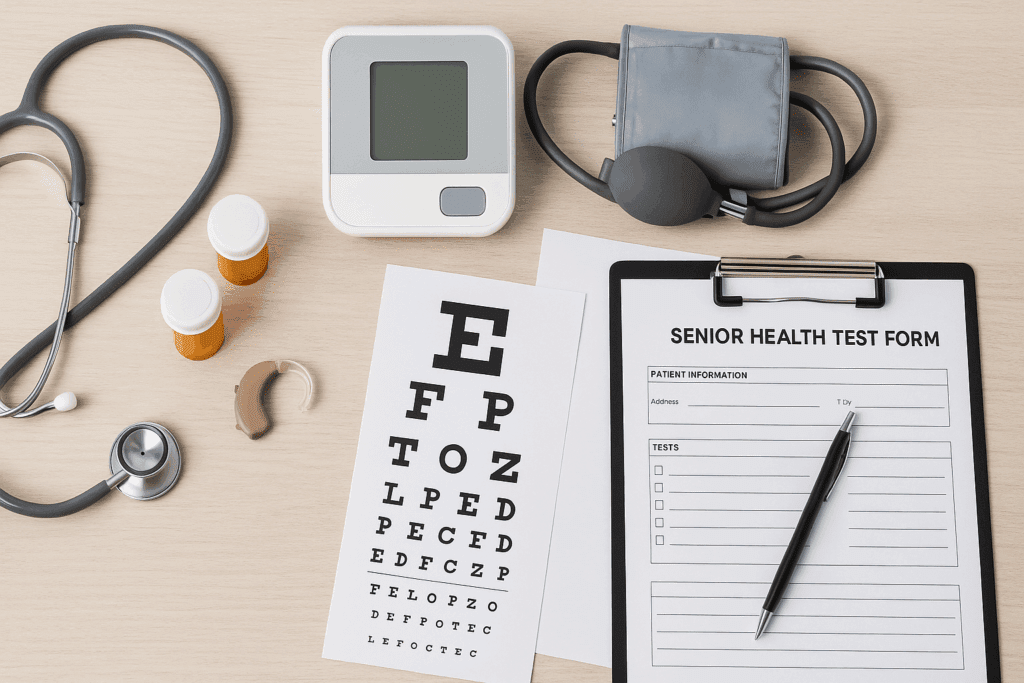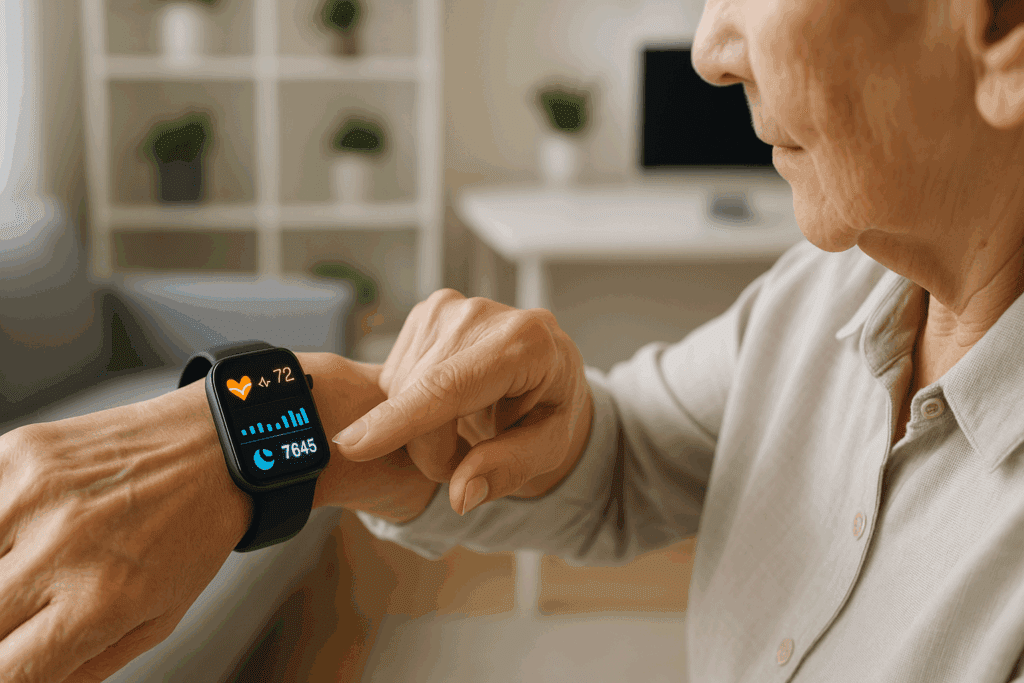Aging is an inevitable journey, and as individuals transition into their senior years, the significance of proactive health management becomes more prominent than ever. One of the most impactful and essential strategies for safeguarding longevity and enhancing quality of life is a routine health checkup for senior citizen populations. These assessments, when done consistently and comprehensively, serve not only as a preventive mechanism but also as a gateway to early detection of potentially life-threatening conditions. Senior health is a multifaceted domain, where subtle changes in bodily function can signal the onset of critical ailments. Understanding the immense value of routine screenings and medical evaluations empowers older adults to make informed decisions, enabling them to thrive physically, mentally, and emotionally.
You may also like: The Essential Guide to the Different Types of Screening Tests for Early Detection and Lasting Wellness

The Role of Preventive Care in Senior Wellness
Preventive healthcare for seniors is not merely about addressing current symptoms but about anticipating future challenges before they escalate. In contrast to reactive medical care, preventive interventions rely on systematic screenings, lifestyle modifications, and personalized monitoring. As seniors age, their susceptibility to chronic conditions such as hypertension, diabetes, cardiovascular disease, osteoporosis, and cognitive decline increases significantly. Through structured health screening for older adults, healthcare providers can detect early indicators of these ailments and implement timely interventions.
Furthermore, the preventive model contributes to cost-effectiveness in long-term care. By avoiding emergency interventions or hospital admissions through early diagnosis, families and healthcare systems alike benefit from reduced financial burdens. Preventive care also helps older adults maintain independence for longer, reducing reliance on assisted living or institutional care. A preventive approach, therefore, is not only medical in nature but deeply personal, preserving dignity, autonomy, and peace of mind for aging individuals.

Why a Health Checkup for Senior Citizen Populations Should Be Routine
Integrating a regular health checkup for senior citizen groups into their wellness routine bridges the gap between early signs of illness and advanced disease states. Many conditions affecting seniors progress insidiously, often lacking noticeable symptoms until irreversible damage has occurred. For instance, bone density loss due to osteoporosis may not be evident until a fracture occurs, and early-stage hypertension can persist silently until it leads to a stroke or cardiac event. Regular screenings create a critical feedback loop for seniors and their caregivers, allowing for timely responses to emerging health issues.
Moreover, health checkups provide a structured opportunity to review medication regimens, monitor side effects, and prevent drug interactions, which are particularly prevalent in older populations due to polypharmacy. These visits also offer valuable space for discussing mental health concerns, which may otherwise be overlooked. Depression, anxiety, and cognitive disorders like dementia often go unreported by seniors due to stigma or lack of awareness. With a proactive care model in place, these dimensions of health can be addressed holistically, enhancing overall well-being.
Understanding the Scope of Health Screening Tests for Elderly Patients
Health screening tests for elderly individuals encompass a wide range of physical, cognitive, and psychological evaluations. Each test is designed with the age-related risks in mind, allowing clinicians to tailor care plans with precision. Routine screenings include blood pressure measurements, lipid panels, blood glucose testing, and cancer screenings such as mammograms, colonoscopies, and prostate evaluations. These tests provide foundational insights into the body’s systemic functioning.
Bone density scans become particularly important for detecting osteoporosis, especially in postmenopausal women and men over 70. Additionally, hearing and vision exams are vital in preserving communication abilities and preventing injury from falls or accidents. Vaccination reviews, such as pneumococcal, shingles, and influenza vaccines, are also typically included to bolster the aging immune system. In cognitive screening, tools like the Mini-Mental State Examination (MMSE) help identify early signs of dementia or Alzheimer’s disease, enabling more effective planning and support.

Tests for Seniors That Shouldn’t Be Overlooked
In addition to the standard evaluations, there are several often underappreciated tests for seniors that deserve consistent attention. For instance, thyroid function tests are critical, as hypothyroidism or hyperthyroidism can cause symptoms that mimic depression or cognitive decline. Kidney function and liver panels also provide insights into organ health, especially for seniors on long-term medications.
Sleep studies are increasingly important given the prevalence of sleep apnea among older adults, which can affect cardiovascular health, mood, and daytime functioning. Nutritional assessments, including vitamin B12, iron, and folate levels, can help address unexplained fatigue or cognitive fog. Dermatological screenings for skin cancer, especially for seniors with prolonged sun exposure in earlier years, are another critical component of a comprehensive health evaluation. Incorporating these nuanced tests into routine checkups creates a more robust and responsive picture of overall health.
Health Screening for Older Adults: A Key to Longer, Healthier Lives
The benefits of health screening for older adults extend beyond early detection; they encompass a philosophy of empowered aging. With regular checkups, seniors can take ownership of their health journey, informed by evidence-based recommendations and transparent discussions with providers. This proactive approach fosters a strong therapeutic alliance between the patient and clinician, facilitating shared decision-making.
Moreover, health screening contributes to emotional well-being. When seniors are confident that their health is being monitored, they often experience reduced anxiety and improved psychological resilience. They can pursue hobbies, travel, and social engagement with fewer concerns about undiagnosed conditions. Family members, too, gain reassurance, knowing their loved ones are under competent care and that any emerging concerns will be addressed promptly. The ripple effect of this confidence improves family dynamics, reduces caregiver stress, and enhances community cohesion.

What Medical Tests Do I Need at 75? Insights for This Critical Milestone
Turning 75 is a significant health milestone that warrants a thoughtful reassessment of medical needs. At this stage, some tests become more frequent, while others may be reconsidered based on life expectancy, comorbidities, and personal values. A comprehensive health checkup for senior citizen individuals aged 75 and older typically includes cardiovascular screenings, including EKGs and echocardiograms if symptoms are present. Blood tests to assess cholesterol, glucose, and kidney function are still essential, as is continued screening for colorectal cancer.
Cognitive assessments take on increased importance at this age, helping differentiate normal age-related forgetfulness from more serious memory disorders. Vision and hearing screenings should continue annually, as impairments in these areas can compromise safety and independence. Fall risk assessments, including gait and balance evaluations, become critical, especially for those with osteoporosis or a history of falls. Immunization reviews are also important to ensure protection against infectious diseases that can have severe consequences in this age group. While some cancer screenings may be reduced depending on risk factors, individualized care planning ensures the right balance between benefit and burden.

Reevaluating Needs: What Medical Tests Do I Need at 80?
As individuals reach their 80s, medical priorities often shift toward preserving quality of life, minimizing invasive procedures, and focusing on symptom management. The question of what medical tests do I need at 80 is nuanced, often guided by functional status rather than chronological age. While many of the same screenings from earlier years still apply, the frequency and intensity may be adjusted.
Geriatric assessments become more comprehensive, encompassing evaluations of mobility, cognition, nutrition, and social support. Tests for seniors at this age should include bone density scans, cardiovascular reviews, and monitoring for metabolic conditions like diabetes. However, the emphasis often shifts from detection to management. For example, blood pressure monitoring may become less aggressive if overly strict control leads to dizziness or falls.
Additionally, mental health evaluations are crucial in this decade. Loneliness, grief, and depression can have profound impacts on physical health. Screening for anxiety, mood disorders, and cognitive decline continues to play a key role in comprehensive care. Ultimately, these evaluations should reflect the values, preferences, and overall goals of each individual, promoting dignity and comfort in advanced age.
The Intersection of Lifestyle and Diagnostic Testing
While diagnostic tools form the backbone of senior health evaluations, they must be viewed in conjunction with lifestyle assessments. Nutrition, physical activity, sleep hygiene, and stress management all modulate the outcomes of health screenings. A sedentary lifestyle, for example, may accelerate cardiovascular risk, while a poor diet can exacerbate blood sugar fluctuations.
Incorporating lifestyle interventions into health checkup routines enhances the utility of medical data. When physicians interpret test results alongside lifestyle factors, their recommendations become more targeted and actionable. For instance, elevated cholesterol levels in a senior who exercises regularly and follows a Mediterranean diet might prompt a different approach than in someone with a high-saturated-fat intake and sedentary habits. The integration of lifestyle coaching with diagnostic precision creates a feedback loop that fosters long-term wellness.
Mental and Emotional Dimensions of Health Screenings
The emotional terrain of aging is often overlooked in clinical settings. However, it is critical to address the psychological impact of health screenings on seniors. The anticipation of test results, the stigma around cognitive decline, and the fear of losing independence can all influence how older adults approach medical evaluations. Compassionate communication and transparent dialogue go a long way in easing these anxieties.
It is also essential to involve seniors in conversations about their health goals. Some may prioritize longevity, while others emphasize comfort or independence. This understanding helps shape the interpretation and utility of health screening for older adults. When seniors feel heard and respected, their engagement with preventive care increases. Clinicians must be equipped not only with diagnostic expertise but with the emotional intelligence to navigate these complex conversations.

The Influence of Family and Caregiver Support on Screening Outcomes
Support networks play a pivotal role in shaping health behaviors and outcomes among seniors. Whether it is a spouse, adult child, or professional caregiver, these individuals often facilitate access to medical care, provide emotional encouragement, and help implement healthcare recommendations. Family involvement can significantly enhance adherence to treatment plans, follow-up schedules, and lifestyle changes.
Health screenings also offer an avenue to educate caregivers about early warning signs, disease progression, and caregiving strategies. Empowering families with knowledge fosters a collaborative care model, where decisions are shared and responsibilities distributed. The role of family in encouraging a regular health checkup for senior citizen loved ones cannot be overstated; it is often the difference between early detection and delayed diagnosis.
Overcoming Barriers to Effective Health Screenings
Despite the clear benefits, several barriers can hinder the widespread adoption of regular health screening tests for elderly individuals. These include logistical challenges such as transportation, mobility issues, and long wait times. Socioeconomic factors, including lack of insurance or fixed incomes, may also deter seniors from seeking preventive care.
Cultural beliefs and generational attitudes toward healthcare further complicate this landscape. Some seniors may view medical care as necessary only when symptoms arise, underestimating the importance of proactive screenings. Addressing these barriers requires a multi-pronged approach, including community outreach programs, telehealth initiatives, and policy interventions that reduce financial and logistical burdens. Healthcare providers must also adopt flexible models of care that accommodate the unique needs of elderly patients.
Technological Advances and the Future of Senior Health Screenings
Emerging technologies are revolutionizing the way health screenings are conducted and interpreted. Wearable devices can now track heart rate variability, sleep patterns, and activity levels, offering real-time data that complements traditional diagnostic tools. Telehealth has expanded access for seniors in remote or underserved areas, allowing them to consult specialists without leaving home.
Artificial intelligence is also enhancing the accuracy of diagnostic interpretations, particularly in imaging and predictive analytics. For example, machine learning algorithms can identify early markers of disease on mammograms or CT scans with remarkable precision. These innovations promise to make health screenings more accessible, personalized, and efficient, aligning with the evolving needs of an aging population.
Frequently Asked Questions: Enhancing the Value of a Health Checkup for Senior Citizen Wellness
How does a health checkup for senior citizen individuals support mental well-being?
While physical tests often take center stage, mental and emotional health should not be overlooked in any comprehensive health checkup for senior citizen adults. These evaluations can uncover early signs of conditions like depression, anxiety, and cognitive decline, all of which are common but frequently underdiagnosed in aging populations. Including screenings such as the Geriatric Depression Scale or memory recall tests during health evaluations can provide essential insights that prevent long-term psychological deterioration. Additionally, these appointments give seniors a structured opportunity to voice their personal concerns, often reducing the stigma around mental health. Ultimately, the psychological benefits of routine checkups can lead to improved mood, greater self-awareness, and a stronger sense of agency over one’s future.
What role do health screening tests for elderly patients play in identifying nutrition deficiencies?
Nutrition often becomes more complex with age due to changing appetite, medication interactions, and dental challenges. Health screening tests for elderly individuals can detect deficiencies in vital nutrients like vitamin D, B12, and iron, which are essential for maintaining cognitive clarity, muscle strength, and immune resilience. Malnutrition in seniors isn’t always visible; it may manifest subtly through fatigue, confusion, or increased susceptibility to illness. Routine blood panels and physical exams can reveal these deficiencies early, prompting tailored interventions such as nutritional counseling or supplementation. These proactive adjustments can significantly elevate quality of life and prevent the spiral of health complications that often begins with a minor dietary imbalance.
Why should families take an active role in scheduling tests for seniors?
Family involvement is crucial in ensuring that tests for seniors are completed consistently and interpreted within a supportive context. Seniors often face logistical hurdles like transportation limitations, digital literacy barriers for appointment scheduling, and cognitive confusion over complex medical instructions. When family members or caregivers step in to assist with coordination, they not only increase compliance but also create an opportunity for intergenerational dialogue around health values. This shared responsibility fosters a safety net that enhances emotional reassurance and accountability. Moreover, families who are engaged in the process are better equipped to recognize subtle changes in health between checkups and can relay those observations to healthcare providers for a more accurate diagnostic picture.
What emerging trends are shaping the future of health screening for older adults?
Technological innovation is revolutionizing health screening for older adults by making evaluations more accessible, personalized, and efficient. Portable diagnostic tools and remote monitoring devices are allowing seniors to track blood pressure, blood glucose, and oxygen levels from home, reducing the need for frequent clinic visits. Artificial intelligence is also being integrated into screening protocols, helping physicians detect anomalies in imaging scans or lab results more rapidly and with higher accuracy. Additionally, personalized screening schedules—based on genomic data and health history—are becoming more common, allowing clinicians to tailor evaluations precisely to an individual’s risk profile. These advancements not only enhance care delivery but also empower seniors to be active participants in managing their health.
What medical tests do I need at 75 that differ from those in earlier decades?
At age 75, a shift occurs from aggressive disease detection toward function-preserving assessments. While many standard evaluations such as lipid profiles and blood glucose monitoring still apply, more nuanced tests become essential. Fall risk assessments, medication interaction reviews, and visual acuity tests gain prominence because they directly impact daily independence and safety. At this age, health practitioners may also begin tailoring cancer screening frequency based on remaining life expectancy and comorbid conditions. Additionally, assessments for frailty—such as grip strength and walking speed—help identify risks that traditional lab tests might miss. All of these components collectively reflect a shift toward a more holistic understanding of what medical tests do I need at 75 to support quality living.
How can regular health checkups help prevent hospitalization in seniors?
Routine checkups can significantly reduce emergency room visits and hospital admissions by detecting conditions before they become acute. Health screening tests for elderly individuals can reveal asymptomatic concerns such as silent urinary tract infections, anemia, or electrolyte imbalances that may otherwise lead to falls, confusion, or heart complications if untreated. Furthermore, regular evaluations can fine-tune medication dosages, helping to prevent adverse drug reactions—a leading cause of senior hospitalizations. Doctors can also assess functional decline early, providing assistive devices or home modifications that prevent injury. Preventing hospitalization not only saves costs but also protects seniors from the stress and disorientation often associated with inpatient care.
Understanding Long-Term Value: Why a Health Checkup for Senior Citizen Adults is a Lifelong Investment
Rather than being seen as a one-time obligation, a health checkup for senior citizen individuals should be viewed as a lifelong strategy for maintaining wellness. The true value lies not only in catching diseases early but also in building a consistent medical history that tracks subtle changes over time. This longitudinal insight enables clinicians to detect patterns—like fluctuating blood pressure or recurring inflammation—that might otherwise go unnoticed. Moreover, these regular appointments build trust between patient and provider, which encourages more honest communication and shared decision-making. A lifelong commitment to checkups becomes a proactive shield against preventable deterioration, ensuring that aging is managed with dignity and foresight.
How do clinicians decide what medical tests do I need at 80?
The decision-making process for what medical tests do I need at 80 often shifts from universal protocols to highly personalized assessments. Clinicians consider the senior’s overall functional ability, chronic disease burden, and personal values regarding intervention. For example, while cancer screenings may be scaled back if the individual has limited mobility or a short life expectancy, evaluations for cognitive function, balance, and sleep quality may be intensified. Doctors also review whether medications should be deprescribed to reduce pill burden and potential side effects. Ultimately, the focus turns toward enhancing comfort, preventing complications, and aligning medical interventions with the patient’s lifestyle and goals.
What makes health screening for older adults different from those in younger age groups?
Health screening for older adults is uniquely tailored to detect age-related vulnerabilities rather than solely focusing on common adult illnesses. While cholesterol and blood sugar checks are universal, screenings in older adults emphasize cognitive function, bone density, hearing, vision, and fall risk—areas rarely covered in younger individuals. Additionally, seniors may undergo more frequent reviews of medication effectiveness and interaction potential due to polypharmacy concerns. Age-specific assessments are also influenced by coexisting conditions that may mask or alter typical symptoms, requiring clinicians to interpret results within a broader physiological context. This personalized approach ensures that medical evaluations remain relevant, precise, and attuned to the changing realities of aging bodies.
What are some practical steps seniors can take between checkups to extend the value of health screening tests for elderly adults?
To maximize the benefits of health screening tests for elderly individuals, it’s essential to maintain health-promoting routines between medical visits. This includes tracking daily health metrics like blood pressure, pulse, or blood sugar when applicable, and documenting any physical or cognitive changes that arise. Engaging in low-impact exercise like walking or tai chi can enhance mobility, balance, and cardiovascular resilience. Keeping a medication diary can help identify any adverse reactions early, allowing timely updates during future appointments. Seniors should also maintain an open line of communication with their care team, reporting issues as they occur rather than waiting for the next scheduled checkup. These steps collectively enhance the utility and relevance of each screening, making future diagnostics more actionable and informed.
Conclusion: Embracing Preventive Wisdom for Lifelong Health
The journey of aging is not simply about extending the number of years lived but about enriching the quality of those years. The vital importance of a health checkup for senior citizen wellness and early detection lies in its transformative potential to identify, prevent, and manage health conditions before they escalate. When seniors engage in regular, comprehensive screenings, they empower themselves with knowledge, confidence, and agency over their health trajectories.
From cardiovascular and metabolic assessments to cognitive and emotional evaluations, the spectrum of tests for seniors must be tailored to individual needs, values, and aspirations. Whether considering what medical tests do I need at 75 or reevaluating needs at 80, each stage of aging demands thoughtful, evidence-based attention. Health screening for older adults is more than a clinical obligation—it is an act of respect, foresight, and compassion. By embracing preventive care and fostering supportive environments, we create a future where seniors are not only living longer but living better.
Further Reading:
14 Important Health Screenings for Older Adults

